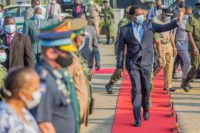Chief government spokesperson Dora Siliya has insisted that the Financial Intelligence Center was trying to be sensational by releasing raw data to the public which has potential to cause disunity within government institutions.
And Siliya has rubbished reports that government intends to establish a School of Witchcraft at the University of Zambia.
Meanwhile, Siliya has clarified that the delegation of Zambian members of parliament in Kenya was there to exchange notes with their counterparts on privileges and ethics, and not to learn how to fight corruption.
Speaking to journalist at a briefing in Lusaka, Wednesday, Siliya said the FIC were wrong and made a mistake by releasing a report of misappropriation of fund in government and other institutions.
“I think that they have done it wrongly but doing something wrong many times does not make it right. Because this is not the first time they are releasing it. I don’t believe so, I think doing something wrong many times does not make it right and I think government is trying to address this lacuna that has been going on that within the same government there are agencies that have the responsibility to do certain work, but their work is being usurped by another agency. And I think it’s part of government harmonization that we need to correct these things. It’s not out of the sense of guilt at all. It is purely a sense of trying to harmonise, government is not saying that we believe there is something wrong or, government is just saying that when raw data is collected, whatever the interpretation of that data, follow me carefully. Government is just saying when data is collected and its raw form, whatever its interpretation, let us hand it over to the right people to conclusively investigate the matters. Nobody is saying that the FIC should not do their work. And that’s very important to understand. We are saying they should do their work. But we are saying they should do it in a manner that is harmonious to everyone in government, including the anti-corruption, including the DEC, including the Police,” Siliya said.
“Because ultimately the police and these other institutions have to take over these issues. So that these cases are not compromised, they are all over in the public space before they can actually be concretized. So it’s in the interest of government and the people of Zambia, to make sure that there is harmony, if indeed this has been the practice in the past it’s regrettable. Because clearly we don’t want sensational raw data there before it has actually been sieved so that the other agencies, not the politicians, can take over these issues and investigate them thoroughly. To me I think its an issue of wanting to be sensational, again, sensationalism sells. Because that is raw data. The President does not take action over rumors first of all, and then within government there are institutions, and this is where the point should be that for the FIC to just release raw data to the public is not sufficient because within government, the police other institutions should conduct their investigations before any action can be taken. There is a lot of information in government that the public might not be aware of now, we don’t release it anyhow, because that the nature of government, we need to process data, to have been tested enough to be taken before the court.”
And Siliya rubbished reports that government intended to establish a School of Witchcraft at the University of Zambia.
“I have heard, and I have seen in the paper today that there is a lot of talk about witchcraft being taught at the University of Zambia. And this is as a result of a meeting that took place yesterday or a day before at which people are insinuating that the UNECSO country commissioner talked about witchcraft. I have here with me the statement given by the commissioner, his name is Dr Charles Ndakala. And nowhere in his statement does it refer to witchcraft. The whole basis of this statement is to share with the nation that government, with the support of UNESCO, has begun a program at the University which has to do with intangible culture. And in this statement, many examples are being given as this to refer to music, to refer to dances, to refer to proverbs and any cultural practices that are intangible and that this is part of what UNESCO supports and that they have given support to start this program at the University of Zambia so that we can begin to create in our country citizens and academicians who have understood some of these intangible aspects of our culture,” Siliya explained.
Meanwhile, Siliya clarified that that the delegation of Zambian members of parliament in Kenya was there to exchange notes with their counterparts on privileges and ethics, and not to learn how to fight corruption.
“On the members of parliament in Kenya, the members of parliament were not in Kenya to learn about corruption. It is very normal, I am aware that parliament sends out missions on the various committees to visit countries and to exchange notes as members of parliament and citizens in those countries. And I know in this particular case I think it’s the committee on privileges, absences and support services at parliament that has gone to Kenya. And the objectives, I am aware because this is a committee on privileges on members of parliament. Their mission to Kenya was to enable them to learn about matters of privileges and discipline and how this in handled in the Kenyan Parliament. Now as part of that agenda, the Kenyans decided that to learn about the ethics issues, the Zambians should visit there, the Kenyan ethics and Corruption service center. So ,the Kenyans invited the Zambians to go and visit this center so that they can learn about the ethics relating to members of parliament in Kenya and not that they had gone there to learn how to fight corruption in Kenya,” said Siliya.












